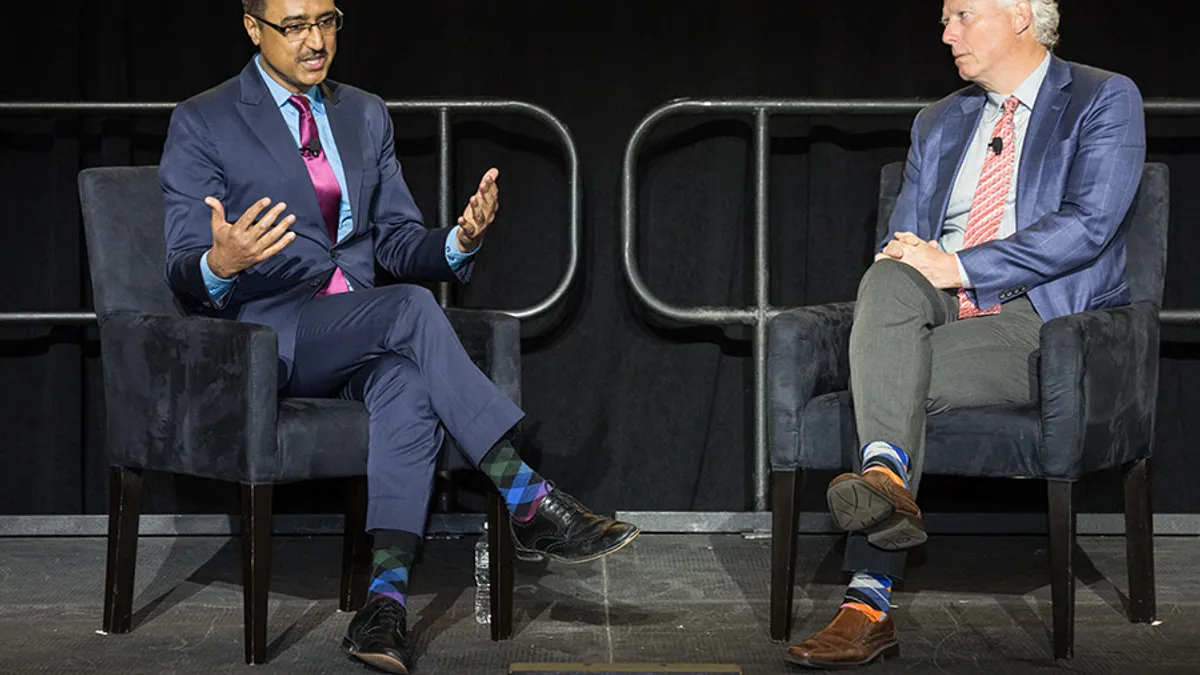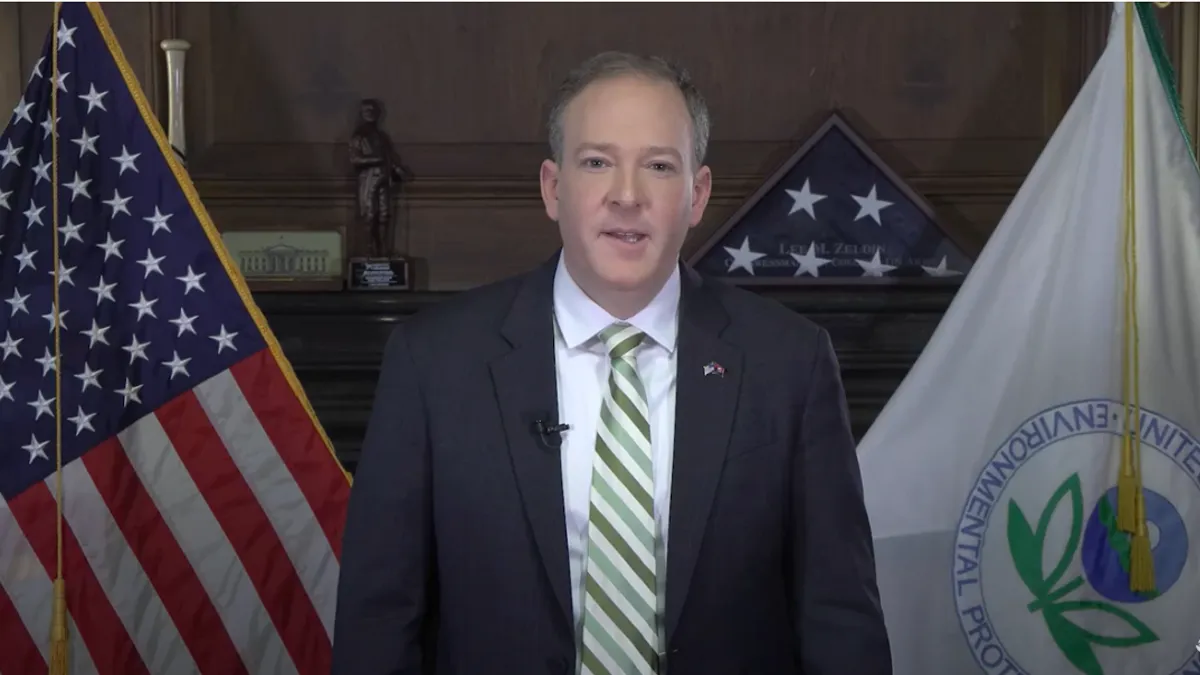Last week, the Smart Cities New York conference at Pier 36 on the Hudson River welcomed 1,300 people for two days of panel discussions, keynote speeches and seminars on a host of issues facing cities as they look to get smarter.
From broadband internet and blockchain to affordable housing and closing the educational achievement gap, speakers covered a wide gamut of areas where city leaders are looking to innovate and improve their citizens’ lives.
With speakers including New York City Mayor Bill de Blasio, Chicago Mayor Rahm Emanuel and Iceland President Guðni Th. Jóhannesson, there was plenty of star power on hand to share best practices with city leaders, private companies and other stakeholders.
Here are five takeaways from the two-day conference.
1. It's time for cities to lead
In a keynote address early in the conference, de Blasio said cities must lead on issues, such as fighting climate change, the opioid crisis and preserving net neutrality, as the federal government appears to have stepped away from a leadership role. "I always say to my dear friends in cities all over this country and all over the world, 'Look at your own power, understand it fully, utilize it fully,'" de Blasio said.
Those sentiments were echoed by Emanuel, who said cities must rely on themselves and each other as the federal government will not be “stepping in and doing things,” and the state government now “is basically Medicaid and prisons” and not much else.
"Twenty years from now, when you look back, we’re at an inflection point where the nation-state is in decline, and the city-state a la Singapore is driving the cultural and economic activity," Emanuel said.
On everything from the adoption of autonomous vehicle (AVs) technology and expanding access to broadband internet, education and affordable housing, speakers agreed there is unlikely to be much progress, if any, from elected officials at the federal level. “The reality is cities are the only place where things are getting done in this country right now,” Columbia, SC Mayor Steve Benjamin said.
2. Smart cities mean smarter citizens
Rather than introducing a raft of new technology to become smarter and more innovative, numerous speakers said the key to becoming a smart city lies in education and giving every resident the opportunity to learn and improve their lives. “For me, a smart city doesn't exist. The thing that exists for me are smart citizens,” Rotterdam Mayor Ahmed Aboutaleb said during a panel discussion.
That extends to initiatives such as Emanuel’s push to offer free community college to all high school graduates from the 2019-2020 school year onward if they maintain a “B” grade average. In addition to the need for all high school seniors to have a post-high school plan before they can receive their diploma, that means “high school is a milestone, not a destination," Emanuel said.
3. Cities must engage citizens, equitably
During a panel discussion to kick off the event, Atlanta Mayor Keisha Lance Bottoms recalled how cybersecurity was “not a topic of conversation” in her administration and among constituents until a massive cyberattack crippled government services. When people couldn't pay their water bills or traffic tickets electronically, more people were made to “understand why it matters.”
Technology is increasingly viewed as a way to engage more citizens with their governments, as opposed to something that city leaders should want for the sake of having new technology. “The goal is not technology,” Emanuel said. “Technology enhances what you’re trying to get towards, but technology is a means, not an end.”
Government leaders said engaging with people from diverse backgrounds is crucial, especially considering the differences between urban and rural areas and between different regions of the same country. Canada’s Minister of Infrastructure and Communities Amarjeet Sohi said he sees it as critical to have more people “sitting at the table trying to solve a problem,” as there is “a lot of potential we can tap into.”
4. Public and private sector partnerships will drive innovation
Within that spirit of cooperation, private and public-sector leaders said governments and their agencies should be more deliberate about working with private businesses, which often can innovate more quickly and deliver services more cheaply. Columbia, SC Mayor Benjamin said for too long government has been “afraid of public-private partnerships (P3s),” but that seems to be changing as services become more expensive to deliver and tax dollars become scarce.
But with new technology set to descend on cities soon, what Benjamin called a “jaded” view of business must change. On a panel discussion about broadband internet and the need for equitable access, Mrinali Ingram, Verizon’s VP for Smart Communities, said the rollout of 5G later this year will require a “strong relationship” between telecommunications companies and the cities they will serve.
Other government leaders said even the smallest jurisdictions can have an impact when they innovate, something Iceland's Johannesson described as “[turning] our smallness into a strength.” He urged leaders to think creatively and not be afraid to do things differently, whether it be collaborating more with the private sector or listening to a new viewpoint from inside government. “Think in solutions. The way things have been done are not necessarily how they should be done now,” he said.
That is particularly true in transportation, where ride-hailing companies such as Uber and Lyft have become integral to getting people around in cities, in addition to the existing public transportation agencies. “In many ways, they are already a part of our public transit,” Rachel Haot, executive director of the Transit Innovation Partnership, said of ride-hailing during a panel discussion. “[We] have to follow what people are using, and understand what people are using so we can adapt to what they need.”
5. We are the world
Unlike some smart cities conferences on U.S. shores, Smart Cities New York welcomed a variety of international speakers and guests, with large delegations joining from the Netherlands, France and Scandinavian countries including Sweden, Iceland and Norway.
Top of mind for the American and international guests was the idea that innovations and research should be shared across borders, as cities can learn from each other regardless of where they are in the world. “We’ve got the world here to talk about smart cities so that American cities can learn,” Jerry Hultin, a Smart Cities New York founder, said in a speech.
In their own speeches, the international speakers said they were open to spreading their work and best practices to the U.S. Johannesson emphasized the country’s work on geothermal technology, which now heat most homes on the island. But he said the country can still learn from others on areas like helping its tourism industry cope with a massive influx of visitors, modernize its fishing industry and have its transportation be more reliant on electric vehicles (EVs).
He noted his country has already worked with researchers from Cornell University on geothermal, and that while Iceland can be proud of its work, international cooperation is always a two-way street. “Please don’t think I think Icelanders are the holders of all knowledge on geothermal,” Johannesson said. “That is not the case.”




















